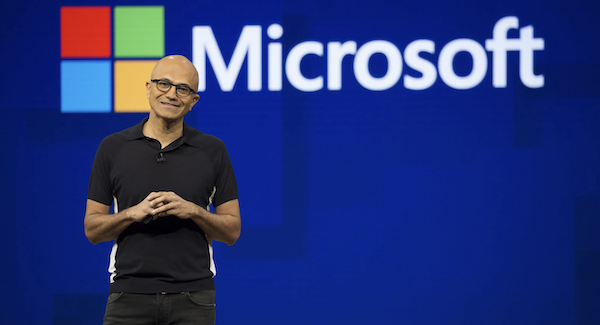Market scorecard
US markets ended higher on Friday, with a solid jobs report boosting confidence in the economy's resilience. The S&P 500 notched a nine-day winning streak, the longest since 2004, rising about 10% from its post-tariff slump. After clawing back much of last month's losses, the index is now down just 3.3% year-to-date.
In company news, Amazon delivered a solid first quarter, but its softer outlook for operating profit weighed on sentiment, leaving the stock down slightly. Apple fared worse, sliding 3.7% after analyst downgrades highlighted renewed worries over tariffs. The biggest news came from Warren Buffett, who said he would step down as CEO of Berkshire Hathaway by the end of the year and hand over the reins to Greg Abel.
On Friday, the JSE All-share closed up 0.82%, the S&P 500 rose 1.47%, and the Nasdaq was 1.51% higher.
Our 10c worth
Bright's banter

Microsoft gave investors exactly the kind of quarter they've been waiting for. Total revenue was up 13% to $70 billion and earnings were $3.46 a share, both beating expectations. This was the kind of performance that reassures long-term holders and tempts the sideline skeptics.
The cloud business, Azure, saw 35% revenue growth, with 16% points attributed to AI, clearly showing that Microsoft's early bet on OpenAI and its Copilot AI assistants are starting to pay off commercially.
More interestingly, despite the rapid pace of AI deployment, capital expenditure came in below expectations at $21.4 billion, marking the first quarterly decline in over two years. This suggests Microsoft is finding ways to scale smartly, even as demand for AI infrastructure continues to outpace supply.
There are also underappreciated tailwinds here. Tariff-related uncertainty, while not hitting Microsoft directly, could prompt more companies to lean into productivity software and AI tools as a hedge against margin compression. Satya Nadella's comment that "software is the most valuable resource to fight inflationary pressure" is more than just rhetoric; it positions Microsoft as an essential service in cost-conscious boardrooms.
This was a solid quarter that showed Microsoft executing on all fronts, including cloud, AI, and enterprise software, while managing costs and delivering upside. For us, it's a reminder that despite all the noise around tariffs, elections, and macro volatility, Microsoft still has levers to pull, and is pulling them with precision.
One thing, from Paul
Steve Edmundson (pictured below) was the manager of the Nevada Public Employees' Retirement System and became a hero in the investment world in 2016 when The Wall Street Journal profiled him in an article titled, "What Does Nevada's $35 Billion Fund Manager Do All Day? Nothing."
Instead of buying private equity assets or corporate bonds as had been popularised in the 1980s by Yale University's David Swensen, Edmundson just bought the market (mostly S&P 500 index funds) and then did nothing. He ended up achieving better much results than his peers.
I'm reminded of this story because April 2025 was one of the most memorable months in recent market history, with the market plunging in reaction to Donald Trump's threats to impose massive trade tariffs and to fire the Fed chief. In the end, he did neither, so the market ended the month higher than it started. We survived a 12% fall, then made it all back.
Naturally, the right thing was to do nothing. Vestact's asset management strategy is to accumulate positions in high-quality companies and hold them, despite all the scary news headlines. Keep calm and carry on.

Byron's beats

I recently listened to the Mark Zuckerberg interview with Joe Rogan. The world of social media is still so fresh and the people who are running these companies are learning new things all the time. In other words, they are making it up as they go because no one else has done it before. Naturally, they will make mistakes. Fortunately, Zuckerberg has been able to admit some of them and backtrack when required.
What really struck a chord was when Mark started talking about regulation. He argued that the US should actively protect its tech companies, particularly against regulations imposed by other countries. He viewed this as a strategic advantage for the US and suggested that the US should adopt a strategy to defend it.
I completely agree, the EU in particular have fined US tech companies $30 billion over the years. The US, should be proud protectors of their fabulous tech behemoths, probably some of its greatest assets ever created. Instead they have led the charge, fining and scrutinising the tech stocks and creating a bad example for global regulators to do the same. The hope is for the Trump administration to reign back on that stance, let's see if that becomes a reality.
Here is the podcast in case you are interested Zuckerberg and Rogan.
Michael's musings

Shortly after Covid, there was a surge in the popularity of alternative investments. Things like solar projects, beehives or owning a part 'stake' in a cow. There was even an option to buy Whiskey casks, with the promise that their value would go up each year as the Whiskey aged. Very sophisticated.
The NYT recently reported earlier that many of the investment companies are frauds. In the worst cases, people bought barrels that didn't exist. In other instances, barrels were sold at vastly inflated prices (6x market rates) or they bought no-name barrels from prestigious farms which don't appreciate as much because they do not carry the official branding.
I was tempted to buy a whiskey barrel, not because of the great returns promised, but out of curiosity. It would have been cool at the Saturday braai to say that I own a whiskey barrel. In the end, the key reason that I didn't was because of the lock-in clauses. I wasn't a fan of locking my money into an investment for 10 years, with an unknown UK company. Too much admin and too much risk.
It is another reminder that very few investments match the returns and flexibility offered by the stock market.
Linkfest, lap it up
Carlos Ghosn is the infamous ex-CEO of Nissan and Renault. He is also an international fugitive and stuck in Lebanon - Ghosn is now a Business Strategy lecturer, which should make for very interesting classes.
Grandparenting is becoming more intense. In the West, older citizens are coming to the party and doing more child care - Grandparents are showing up.
Signing off
Asian markets kicked off the week on a positive note, with the MSCI Asia-Pacific index trading higher. Local currencies also rallied as the dollar weakened and traders looked for signs of progress on trade negotiations. The Taiwan dollar stole the show, soaring 5%, its biggest intraday move in more than 30 years, while the Malaysian ringgit climbed 1% to a five-month high.
In local company news, Gold Fields is back at the table with Gold Road Resources, confirming they are in talks to acquire the Aussie gold miner in a full takeover deal structured through an Australian scheme of arrangement. Elsewhere, Oceana expects HEPS to drop 40-48% for the half-year, as fish oil prices have normalised after last year's bumper gains driven by Daybrook and tight supply.
US equity futures edged lower pre-market. The Rand is trading at around R18.37 to the greenback.
Are you ready for the 5-day week? Dive in and give it your all.